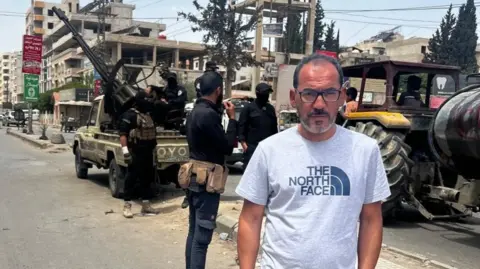BBC private Arab correspondent
 BBC
BBCOn the morning of May 9, I was part of the BBC Arab team, which left the Syrian capital, Damascus, to the southern province of Dera. From there, we planned to go to the border with the Golan Heights occupied by Israel.
We wanted to approach the Syrian territories that the Israeli army seized since December, when the Israeli Prime Minister said it has indefinitely controlled a cut -off buffer zone and the surrounding areas after the fall of Bashar al -Assad’s regime.
We were a team of seven individuals – I (a British citizen), two Iraqi BBC employees, four Syrians – three independents and one of the BBC photographer.
We were imagining near a UNDOF monitoring site, near the city of Al -Ra`fa, when an official from the United Nations told us that the Israeli team had inquired about our identity and informed us that we were a BBC crew.
We then headed north towards the city of Quneitra, which has been located inside the buffer zone since the 1974 disengagement agreement between Syria and Israel, which acquired the Golan during the Middle East war in 1967.
About 200 meters (660 feet) from the city, it prevented a non -liberated checkpoint. Besides the checkpoint, we monitored Merkava tanks, one of which was a Israeli flag.
From a nearby tower, two Israeli soldiers were watching us – one of them through perspectives – and my colleague held a BBC identifier to see them.
The BBC has complained to the Israeli army about what happened next to my team, but it has not yet received a response.
 AFP
AFPA minute after the start of filming in the area, a white car approached the other side to the checkpoint.
Four Israeli soldiers left the car and surrounded us. They directed their rifles on our heads and ordered us to place the camera on the side of the road. I tried to explain that we were the BBC crew, but things escalated unexpectedly.
I managed to send a message to my BBC colleagues in London, saying that we were stopped by the Israeli army before our phones and all the equipment confiscated. More Israeli soldiers arrived at a Hamvee military vehicle, and our car was completely searched.
The soldiers took us through a barrier to the city of Quneitra and stopped at the crossing point separating the Quneitra from the occupied Golan. There, the soldiers started reviewing the shots while we sat in our car, while one of them operated his gun on my head of meters. After more than two hours, one of the soldiers asked me to leave the car and speak on the mobile phone.
I did not know who the person was at stake. The broken Arabs spoke. He asked why we were filming Israeli military positions. I told him that I was a British PPC and explained to him the nature of our work. I returned to my car, and the gun was once again aimed at my head.
Another hour of waiting, another vehicle arrived. A group of security personnel came out of the car carrying its gangs and ZIP plastic relationships and asked me to go out first.
The main officer, who spoke the dialect of the Palestinian Arabic language fluently, took me with his hand towards one of the rooms at the crossing point previously used by the Syrian army. The floor was scattered with broken glass and garbage. Tell me that they will treat me differently – there are no handcuffs, nor blindfold – unlike the rest of my team.
I was shocking. I asked why they were doing this when they knew that we were a BBC crew.
He said he wanted to help take us out quickly and that we had to comply with their instructions.

Moments later, another officer entered and told me to take off all my clothes except for my interior clothes. I initially refused, but they insisted, and threatened me, so I complied. I even visited my interior clothes, in front and back, search my clothes, then told me to return them and began to interrogate me – including personal questions about my children and their ages.
When they finally allowed me to leave the room, I saw the terrible scene of my team members, they tied and disappointed with the blindfold. He appealed to the officer to release them, and promised to do this after the interrogation. They were transferred one by one to the same room to search for the tape and interrogation.
They returned with their hands still binding, but not blindfolded. The team’s interrogation lasted for more than two hours, during which all our phones and laptops were examined, and many pictures – including personal photos – were deleted.
The officer threatened us with worse consequences if we approach the border from the Syrian side again, and he said that they know everything about us and will track us if any hidden or not deleted image is published at all.
About seven hours after our detention – was at 21:00 – we took two cars, one in front of our car and the other behind us, to a rural area about 2 km (1.2 miles) outside Quneitra. There, the vehicles stopped and a bag containing our phones was thrown towards us before leaving the vehicles.
We lost in the dark without a sign, no internet or an idea of our whereabouts, and we continued to drive until we reached a small village.
A group of children referred to the highway, warning that a wrong turn may attract Israeli fire. After ten minutes, we found the way. Forty -five minutes later, we were in Damascus.
https://ichef.bbci.co.uk/news/1024/branded_news/a5b1/live/b18e6000-4073-11f0-b6e6-4ddb91039da1.jpg
2025-06-05 09:03:00














